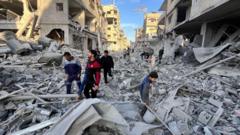As the humanitarian crisis deepens in northern Gaza, the United Nations has reported that for over 40 days, virtually no aid has reached the besieged regions, particularly Beit Hanoun, Beit Lahia, and Jabalia, affecting an estimated 65,000 to 75,000 residents. The UN emphasized that bakeries and kitchens have shut down, intensifying the plight of Palestinians facing diminishing conditions for survival. A UN-backed assessment has pointed to an imminent risk of famine in these areas, underscoring an urgent need for immediate action.
Concurrently, the Israeli military asserts that its six-week-long offensive is aimed at targeting regrouping Hamas fighters. They maintain that civilian evacuations and medical supply deliveries are facilitated despite the ongoing conflict. The impact of these military operations has been dire; hundreds have died, and between 100,000 and 130,000 individuals displaced have relocated to Gaza City, where resources such as shelter and healthcare remain alarmingly scarce.
UN agencies initially planned 31 humanitarian missions to northern Gaza from November 1 to 18, but 27 of these missions faced outright rejection or severe impediments by Israeli authorities. The UN spokesperson, Stéphane Dujarric, commented on the urgency of the situation, stating that the IPC Famine Review Committee had declared critical action needed in the coming days. Due to these restrictions, essential services like nutrition support for vulnerable populations have been suspended, exacerbating the already dire health crisis.
Access to the few hospitals that still operate in the region is highly limited, with reports indicating a lack of medical supplies and fuel. On a recent mission to Kamal Adwan hospital in Beit Lahia, a World Health Organization team managed to deliver some fuel and transfer patients, but were forced to offload food and medical supplies at an Israeli military checkpoint.
Reports from Gaza's Hamas-run health ministry reflect the catastrophic state of healthcare, with hospitals struggling to care for malnourished children and patients suffering from dehydration. The ongoing blockade complicates support for aid organizations working tirelessly amid the violence.
As the Israeli Defense Forces continue their operations, including aerial strikes that have resulted in civilian casualties, including children, stories of displacement add to the humanitarian crisis narrative. A boy from Beit Lahia illustrated the chaos and despair, describing their struggles to find shelter and resources in Gaza City amidst the influx of displaced families.
The backdrop of this ongoing conflict highlights a tragic cycle—Israel's military campaign in response to the October 7 attack by Hamas, leading to nearly 44,000 reported deaths in Gaza since that time. Amidst these escalating tensions, the immediacy of the humanitarian needs and the complexities of delivering aid remain critical challenges for the international community and organizations striving for relief in the region.



















